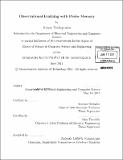| dc.contributor.advisor | Asuman Ozdaglar and John Tsitsiklis. | en_US |
| dc.contributor.author | Drakopoulos, Kimon | en_US |
| dc.contributor.other | Massachusetts Institute of Technology. Dept. of Electrical Engineering and Computer Science. | en_US |
| dc.date.accessioned | 2011-09-27T18:34:07Z | |
| dc.date.available | 2011-09-27T18:34:07Z | |
| dc.date.copyright | 2011 | en_US |
| dc.date.issued | 2011 | en_US |
| dc.identifier.uri | http://hdl.handle.net/1721.1/66027 | |
| dc.description | Thesis (S.M.)--Massachusetts Institute of Technology, Dept. of Electrical Engineering and Computer Science, 2011. | en_US |
| dc.description | Cataloged from PDF version of thesis. | en_US |
| dc.description | Includes bibliographical references (p. 113-114). | en_US |
| dc.description.abstract | We study a model of sequential decision making under uncertainty by a population of agents. Each agent prior to making a decision receives a private signal regarding a binary underlying state of the world. Moreover she observes the actions of her last K immediate predecessors. We discriminate between the cases of bounded and unbounded informativeness of private signals. In contrast to the literature that typically assumes myopic agents who choose the action that maximizes the probability of making the correct decision (the decision that identifies correctly the underlying state), in our model we assume that agents are forward looking, maximizing the discounted sum of the probabilities of a correct decision from all the future agents including theirs. Therefore, an agent when making a decision takes into account the impact that this decision will have on the subsequent agents. We investigate whether in a Perfect Bayesian Equilibrium of this model individual's decisions converge to the correct state of the world, in probability, and we show that this cannot happen for any K and any discount factor if private signals' informativeness is bounded. As a benchmark, we analyze the design limits associated with this problem, which entail constructing decision profiles that dictate each agent's action as a function of her information set, given by her private signal and the last K decisions. We investigate the case of bounded informativeness of the private signals. We answer the question whether there exists a decision profile that results in agents' actions converging to the correct state of the world, a property that we call learning. We first study almost sure learning and prove that it is impossible under any decision rule. We then explore learning in probability, where a dichotomy arises. Specifically, if K = 1 we show that learning in probability is impossible under any decision rule, while for K > 2 we design a decision rule that achieves it. | en_US |
| dc.description.statementofresponsibility | by Kimon Drakopoulos. | en_US |
| dc.format.extent | 114 p. | en_US |
| dc.language.iso | eng | en_US |
| dc.publisher | Massachusetts Institute of Technology | en_US |
| dc.rights | M.I.T. theses are protected by
copyright. They may be viewed from this source for any purpose, but
reproduction or distribution in any format is prohibited without written
permission. See provided URL for inquiries about permission. | en_US |
| dc.rights.uri | http://dspace.mit.edu/handle/1721.1/7582 | en_US |
| dc.subject | Electrical Engineering and Computer Science. | en_US |
| dc.title | Observational learning with finite memory | en_US |
| dc.type | Thesis | en_US |
| dc.description.degree | S.M. | en_US |
| dc.contributor.department | Massachusetts Institute of Technology. Department of Electrical Engineering and Computer Science | |
| dc.identifier.oclc | 752140378 | en_US |
